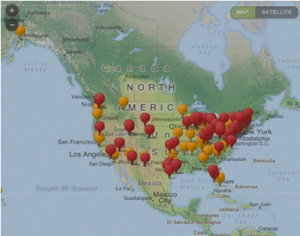 Kelleigh Nelson
Kelleigh Nelson
I see in Communism the focus of the concentrated evil of our time. —Whittaker Chambers
For in this century, within the next decades, will be decided for generations whether all mankind is to become Communist, whether the whole world is to become free, or whether, in the struggle, civilization as we know it is to be completely destroyed or completely changed. —Whittaker Chambers
God is on your side? Is he a conservative? The Devil is on my side, he’s a good communist. —Joseph Stalin, Soviet leader, to Winston Churchill at Tehran, November 1943
Amid escalating tensions between the U.S. and China over a trade war, Covid-19, and threats of Chinese espionage and political turmoil in Hong Kong, critics worry that China uses their Confucius Institutes to promote Chinese Communist Party propaganda on American college campuses. They are right to worry!
The University of Illinois at Champaign/Urbana is not the only cell. Party cells have appeared in California, Ohio, New York, Connecticut, North Dakota, and West Virginia. The cells appear to be part of a strategy, now expanded under Chinese President Xi Jinping, to extend direct party control globally and to insulate students and scholars abroad from the influence of “harmful ideology,” (i.e. America’s constitutional freedoms) sometimes by asking members to report on each other’s behaviors and beliefs.
 Two years ago, in the National Defense Authorization Act, Congress voted to strip colleges and universities of certain Pentagon grants unless they closed their Confucius Institutes which promote Chinese cells. Yet they are still flourishing on American campuses. Why? Because American universities have been looking to global sources to fill seats and find cash in the face of government cuts.
Two years ago, in the National Defense Authorization Act, Congress voted to strip colleges and universities of certain Pentagon grants unless they closed their Confucius Institutes which promote Chinese cells. Yet they are still flourishing on American campuses. Why? Because American universities have been looking to global sources to fill seats and find cash in the face of government cuts.
Chinese Gifts to American Universities
About 115 colleges received monetary gifts, contracts or both from sources in mainland China in recent years according to a Bloomberg analysis of U.S. government data. The leader was Harvard University, which pulled in $93.7 million, the majority as gifts. The University of Southern California and University of Pennsylvania were second and third. At the University of Illinois at Champaign/Urbana, $27 million of the $35 million in contracts with Chinese sources is directed to a partnership between the engineering school and Zhejiang University to develop a program in Haining. Many small universities are also affected; Middle Tennessee State received $1.1 million. Link
In a recent WSJ article, U.S. Presses Universities on China Assets, a letter came from Keith Krach of the State Department urging university endowments to divest themselves of Chinese stocks and disclose Chinese assets held in their index funds.
China’s growing prominence in emerging-markets indexes has steered more money from U.S. institutions into China, putting many endowments at odds with the Trump administration’s increasingly confrontational stance toward Beijing. A growing chorus from DC has linked Chinese stocks to human-rights violations, such as the treatment of the Muslim Uighurs and slave trade, not to mention organ “harvesting” from inmates, and the building of China’s military via US dollars.
“China is a threat to the world in a sense, because they’re building a military faster than anybody and, frankly, they’re using U.S. money,” Trump told reporters at a news conference last September as he discussed global trade with Australia’s prime minister.
Higher education’s alarming willingness to accept money at the expense of principles that universities are ostensibly devoted to upholding clearly paves the way for socialist and communist indoctrination into America’s young minds. At a time when universities are as willing as ever to shield their charges from controversial viewpoints, i.e. conservatism, some nonetheless welcome foreign, communist propaganda—if the price is right, resulting in American universities becoming a soft target for China’s spies.
 Confucius Institutes
Confucius Institutes
The first Confucius Institute opened in South Korea in 2004. They quickly spread to Japan, Australia, Canada and Europe. The United States, China’s biggest geopolitical rival, has been a particular focus, fully 40 percent of Confucius Institutes are stateside. In addition to the Institutes at universities, Hanban also operates hundreds of so-called Confucius Classrooms in primary and secondary schools. The public-school system of Chicago, for example, has outsourced its Chinese program to Confucius Classrooms.
In 2017, the University of North Carolina at Charlotte made an announcement to great fanfare. The university would soon open a branch of the Confucius Institute, the Chinese government-funded educational institutions that teach Chinese language, culture and history.
More than a decade after they were created, Confucius Institutes have sprouted up at more than 500 college campuses worldwide, with more than 100 of them in the United States—including at The George Washington University, the University of Michigan and the University of Iowa. Overseen by a branch of the Chinese Ministry of Education known colloquially as Hanban, the institutes are part of a broader propaganda initiative that the Chinese government is pumping an estimated $10 billion into annually, and they have only been bolstered by growing interest in China among American college students. Hanban is an entity funded and run by the Chinese government’s Ministry of Education. They also pay and screen who teaches the institute’s courses.
Confucius Institutes teach a very particular, Beijing-approved version of Chinese culture and history, one that ignores concerns over human rights, for example, and teaches that Taiwan and Tibet indisputably belong to Mainland China. Tiananmen Square is never mentioned, neither is the Hong Kong desire for freedom as espoused by America’s President Donald Trump.
The UK reports that on balance, given the evidence they’ve received, and while the teaching of Chinese language and culture should be welcomed and encouraged, Confucius Institutes as they are currently constituted threaten academic freedom and freedom of expression in universities around the world and represent an endeavor by the Chinese Communist Party to spread its propaganda and suppress its critics beyond its borders. America agrees with this assessment.
National Review reported that Alabama’s legislature is seeking to ban the Confucius schools in their state. The other 49 states need to follow suit.
China’s National Security Law
The number of Chinese students at U.S. colleges has almost tripled over a decade. China accounts for one-third of the 1.1 million foreign students, according to data from 2018-19 compiled by the Institute of International Education. Schools have been looking to global sources to fill seats and find cash in the face of government cuts.
The People’s Republic of China (PRC) passed a national security law for Hong Kong that aims to quell anti-government protests following a year of unrest in Taiwan’s global financial hub. The effect of the new national security law is extending far beyond the territory to American college campuses.
The new national security law stemmed from the pro-democracy movement in Hong Kong and allows China to find and prosecute people for “sedition, subversion, terrorism, and colluding with foreign forces.” Under the national security law, suspects could be removed to mainland China, handled within the mainland’s criminal justice system and tried under mainland law. … Being charged with a national security crime on the mainland can lead to arbitrary or even secret detention.
Elite universities, Harvard and Princeton, are trying to protect students from China’s National Security Law. Professors are turning to code names, warning labels to protect students.
Classes at some elite universities will carry a warning label this fall: This course may cover material considered politically sensitive by China. And schools are weighing measures to try to shield students and faculty from prosecution by Chinese authorities.
No comments:
Post a Comment
Comments always welcome!